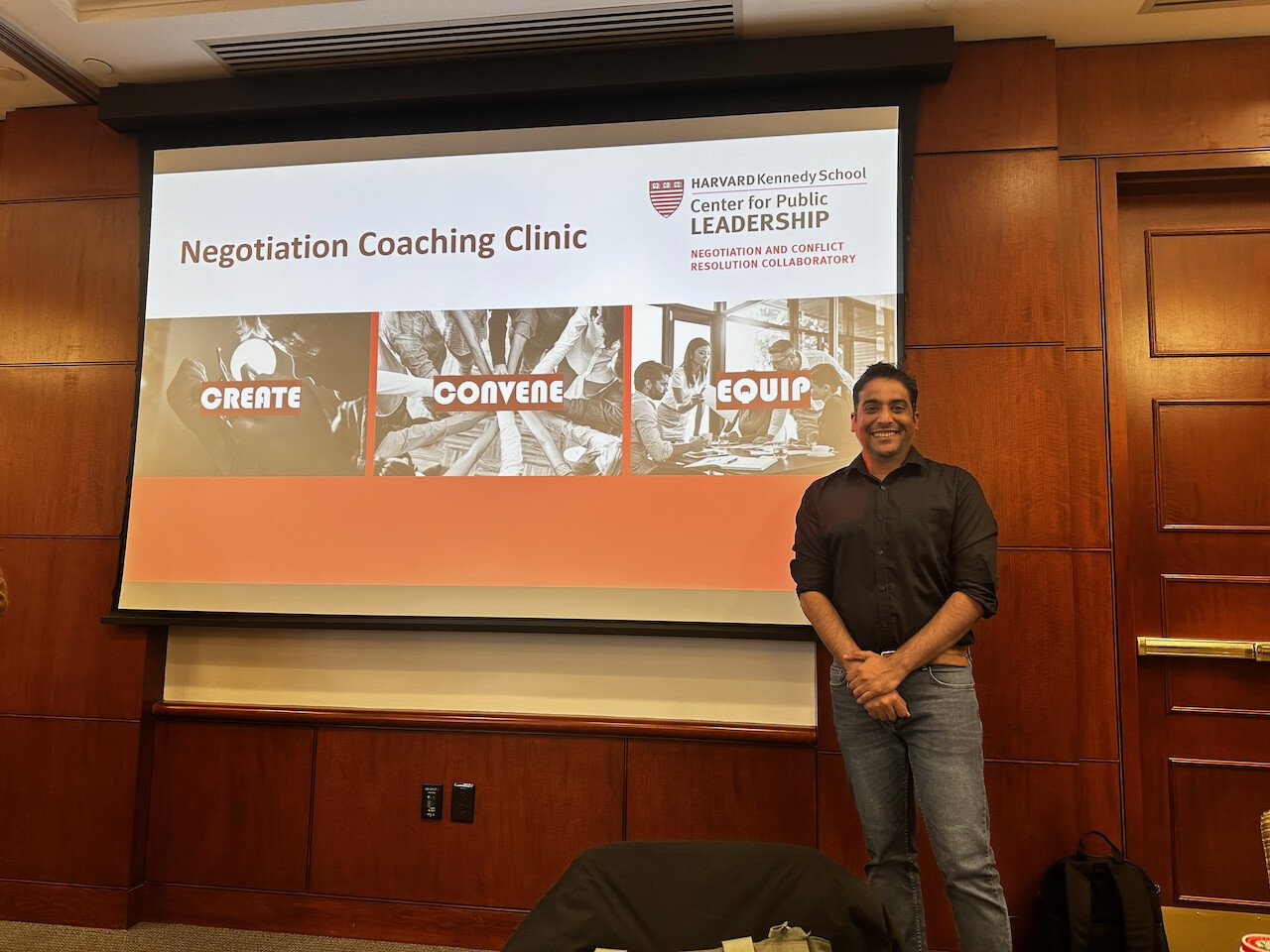Celebrating 10+ Semesters of Negotiation Growth at Harvard
It’s commencement week at Harvard.
It’s a time of celebration, reflection, and excitement about how graduates will be applying newfound skills and knowledge to the next step in their careers. During commencement week, everything else at the university pauses while students and families attend various celebrations, activities, and alumni return for reunions across campus. (I once had an Indian classmate describe commencement week as very similar to an Indian wedding 😂.)
Photo Courtesy of Harvard University
Congratulations to the graduates!
I want to give a special shout-out to the participants and coaches who participated in the 10th and 11th iteration of the Negotiation Coaching Clinic, the program I oversee at Harvard. An additional congratulations to the two Master in Public Policy students who worked with me on a separate report on evaluating accessibility of negotiation training for women (I’ll write more about that in a separate post.)
The Journey So Far
Ronak Jogeshwar, a Harvard graduate and participant in the Spring 2024 NCRC Clinic
In autumn of 2023, we hit a milestone - the 10th semester of running the Clinic since its inception in 2018 - and I’m so appreciative of everyone who participated over the years. As we mark the completion of more than ten semesters of the Clinic, it's time to celebrate the remarkable journey we've embarked upon.
It all began as a modest initiative (and me researching best coaching practices as a summer research assistant for a negotiation professor) to empower students with essential negotiation skills and provide 1-1 coaching outside of the classroom experience. The Clinic has flourished into a cornerstone of the Negotiation and Conflict Resolution Collaboratory’s programming, impacting hundreds of students over the years.
NCRC director, Monica Giannone, giving opening remarks
Our program was founded on the belief that negotiation is not merely a skill but an art—one that can be honed with the right guidance and practice. Over the years, we've welcomed a diverse array of students from various disciplines, all eager to learn the nuances of effective negotiation. The growth in participation and the consistent positive feedback from our participants have been both humbling and inspiring.
From the outset, our mission has been clear: to provide students with curated one-on-one coaching that complements their academic learning. We've structured our sessions to be interactive and dynamic, using real-world scenarios that prepare students for the complexities of professional and personal negotiations. Our coaches, past Clinic participants who completed our dedicated New Coach Training, have played a pivotal role in maintaining the high standards of our program.
Lessons Learned and Observations
Reflecting on the past 10+ semesters, these key observations and lessons stand out, shaping the future direction of our program.
1: The impact of gender
Each semester we have a higher rate of women applying to participate in the Clinic than men (and only 1% of applicants identify as non-binary, although I suspect that rate will go up as social norms change and evolve). There is an incredible amount of pressure on women to negotiate well. (I talk about this a bit on my guest spot on the NegotiateX podcast.)
An evaluation of application submissions show that women are worried about being part of the inaccurate narrative that they are “worse” negotiators and are afraid that if they don’t negotiate well, they’ll be taken advantage of.
Not only do a higher rate of women apply for the Clinic, but a high rate of gendered issues come up during the coaching sessions.
Every few years, we review the themes of coaching sessions and crunch data on what topics tend to be top of mind for participants. While participants may not realize that some issues have a gendered angle when they mention them, the research shows that there are definitely gendered patterns.
For example:
When discussing with a participant on anchoring strategies, women tend to make more concessions before entering into a negotiation conversation.
Or they frequently worry about being perceived as “greedy” or “unreasonable”.
They also have to deal with biased feedback that they were “too aggressive” or “demanding” when displaying the same behaviors as men.
(If you want to learn more about the research on gender and negotiation and strategies on how to get around them, check out my free 30-minute webinar.)
As a result of this observed trend, we’ve included a section on gender bias in the New Coach Training for the Clinic and we’ve received incredibly positive feedback from trainees. I was a bit hesitant to initiate this part of the training, concerned that I’d be accused of having a “personal agenda”, but what I’ve actually found is that the coaches were incredibly appreciative of having this research on gender in their back pocket.
The most positive feedback we get on this section of the training is actually from the men coaches who want to be informed and adequately address such an important issue but don't have the language or skills on how to do so. I’ve had several debriefs where they feel better equipped and their previous concerns on whether they had the authority to speak on issues of gender or fears of getting “canceled” had dissipated.
2: The greatest growth as a negotiator starts with identifying inner obstacles
Joan leading a discussion with the cohort
Most participants enter the Clinic assuming that their learning will come from implementing some of the strategies that they learned in their negotiation classes.
That is definitely true; however, the greatest learning that they describe in their feedback surveys is how they were able to work with their coach to identify psychological and emotional obstacles that prevented them from implementing the strategies effectively.
For example, when a conversation gets heated, negotiators often let their emotions take over and lose sight of any logic. While negotiation theory might teach you to take the “negotiator’s pause” - to walk away for a breather and come back to the conversation with a clearer head, many participants in the Clinic struggle to walk away in the heat of the moment.
Clinic coaches meeting
When working with coaches, participants identify the reasons why it’s so hard to walk away. (A trend I noticed for some participants of marginalized backgrounds - it’s because they’ve often had to fight to be heard in a room and so they revert to getting louder and dominating a conversation because that’s the only way they were heard in the past.)
After diagnosing the obstacle, participants work with their coaches to come up with practical, hands-on, preemptive strategies to increase the likelihood of implementing a negotiator’s pause. While this may sound incredibly simple, effective implementation can have a huge impact on the outcome of the negotiation.
3. An increased investment in coaching
The 11th cohort of the NCRC Clinic at Harvard
Even when coaches have only worked with participants for a short amount of time, they develop strong, trust-based relationships. This creates a space for participants to put egos aside and do some deep reflecting that allows them to develop their skills at an accelerated rate.
In a casual conversation a few weeks ago, a program participant said “I don’t want to over-exaggerate, but this program was transformative.” I’m proud of what this program has become - and the impact we’ve made over the years.
Participants come out of the Clinic having experienced the power of effective coaching. They are open to being continuously coached and are excited about learning to develop coaching skills themselves. In the past few years, we’ve been oversubscribed in the New Coach Trainings, having to limit the number of participants.
Looking Ahead
Our long-term goals include more opportunities for students to learn to be coaches because these skills are widely applicable to so many different environments.
In a listening tour of Clinic alumni last summer, a former coach in our program said, “This training has probably been the more transformational thing... it changed the way I show up. The feedback I get in my job is very different from previously. Thank you, Joan.”
It’s been incredibly heartwarming to be told we played such a pivotal role in their development and reinvests me in this work everyday.
Spring 2021 Clinic Coaches
As we celebrate our 10+ milestone, we're filled with gratitude for the support and enthusiasm of our students, faculty, and partners. The past ten semesters have laid a strong foundation, but our journey is far from over. We are committed to evolving and adapting our program to meet the changing needs of our students and the broader negotiation landscape.
The feedback loop from our participants has been invaluable. Each semester, we gather insights on what worked well and what could be improved.
Photo Courtesy of Harvard University
This iterative process of refining our program ensures that we remain at the cutting edge of negotiation education. Our commitment to continuous improvement has been a key factor in our sustained success.
By staying true to our mission and embracing innovation, we are confident that the next decade will bring even greater achievements. Thank you to everyone who has been a part of our journey. Here’s to many more semesters of negotiation excellence at Harvard!
About the Author:
Joan is a negotiation coach and trainer. She served as a research fellow at the Women and Public Policy Program and started multiple negotiation coaching programs at Harvard.















